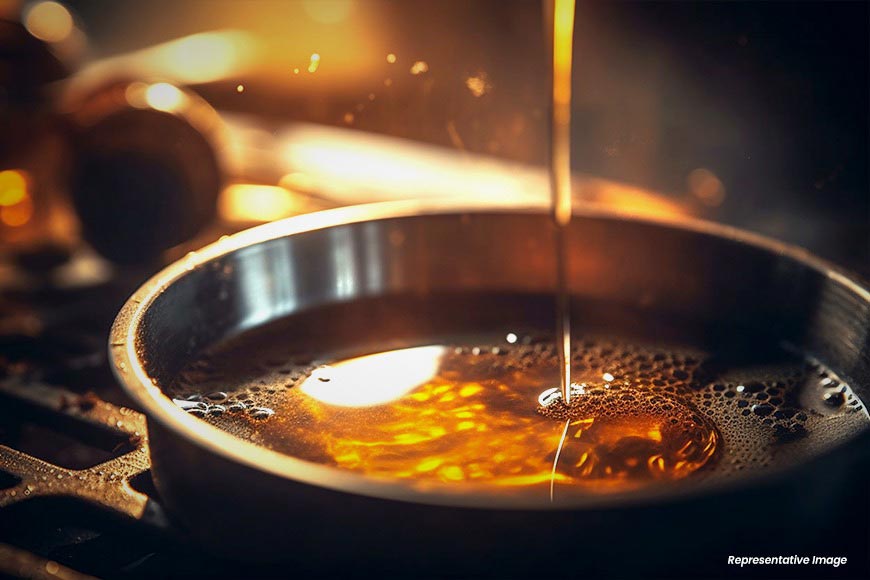The “Jhanjh” of Sorsher Tel in Bengali cuisine - GetBengal story

The “Jhanjh” (acridity) of “Sorsher tel” (Mustard oil) define the rawness of Bengal’s cuisine. From Sorshe Ilish to simple Jhaalmuri, every mouthwatering Bengali dish and snacks come alive with the strong flavour of mustard oil. This healthy golden liquid plays a crucial role in making the state’s food culture unforgettable, which lingers in the tongue to taste once more.
Mustard oil not only stays within its limits in foods, but also carries a legacy of festivity and healing.
The use of mustard oil dates back thousands of years, around 3000 BCE. The Indian subcontinent started cultivation of mustard seed around that era and it became one of the earliest domesticated oilseeds. Apart from being used as a cooking oil, mustard oil is mentioned in ancient Ayurvedic texts as an exceptional medicinal and therapeutic component that serves exceptional benefits in digestion and joint health.
Now Bengal is the epicentre of utilising mustard oil, which was globally recognised and highly consumed by Americans. Also, ancient Romans used mustard seeds in wine for its strong flavour and healing properties.
Among 40 species of mustards, only three, which are black, white, and brown, are edible. Mentionable, each seed contains 30% of oil, making them ideal for extraction.
In the early days, these seeds were crushed in a ghani in wooden or stone mills that preserved the rawness and pungent flavour of the oil. However, in the present day, “Kachi-Ghani” or Cold-Press method is widely followed, where seeds are pressed at low temperature, retaining their natural properties.
Allyl isothiocyanate is the main reason that makes the taste of mustard oil sharp and strong. Allyl isothiocyanate is a sulfur-based element that gives the oil its biting smell and that tear-causing feeling (the Jhanjh). Since this compound is light and mixes easily with fat, mustard oil is often smelled even before opening the bottle. In Bengali kitchens, this sharp and unique aroma is loved, not avoided.
Every Bengali dish is unique due to its beginning process, which is the sizzle of mustard oil. From Shorshe Ilish to Aloo Posto and Beguni, this oil defines the flavour of the cuisine. The maximum flavour of authentic Bengali dishes comes from the smoke of the heated mustard oil, a ritual that softens its raw edge while enhancing its aroma. It absorbs spices beautifully without leaving an aftertaste.
Beyond everyday cooking, mustard oil also plays a role in natural preservation due to being rich in antimicrobial properties. The oil is ideal for traditional achar (pickles), helping them stay fresh for months in Bengal’s humid climate.
Mustard has always been a part of Bengal’s social and cultural life. Kasundi, the famous mustard relish, was once made only for royal and upper-caste families and was seen as a special treat. But today, it has become everyone’s favourite, found on almost every Bengali dining table, enjoyed with rice, fritters, or fried fish.
In essence, mustard oil is not just about taste; it is about history, memory, and belonging. Every whiff of its sharp aroma connects Bengalis to their roots, reminding them that in every drop of this golden oil lives the flavour and identity of Bengal itself.










